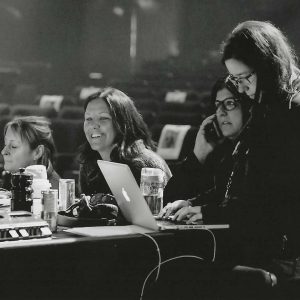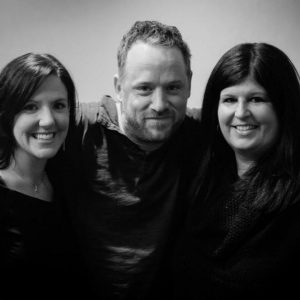SOCAN members! Ever wondered who makes the decisions that might influence the rest of your career? In this series, “Decision-Makers,” SOCAN’s online magazine features interviews with some of them, and reveals what motivates them.
She’s simultaneously candid yet lucid, calm yet filled with a sense of urgency. Julie Gariépy has an undeniably endearing personality. With stimulating energy and a teen spirit, she’s held several positions throughout her 26 years of service at ADISQ (the Québec equivalent of the JUNOs). With the Gala just a few days away, she spoke with Paroles & Musique.

Photo: Isa Otis
“When I started as a producer, I knew the mandates of ADISQ inside and out,” says Gariépy. “But then I had to learn everything about the world of television, and managing that team. Sure, it’s stressful, but I was lucky that I knew everything under the hood beforehand.
“The context this year is pretty much normal, even though there are still some considerable restrictions on the production. But at least we’re back in our usual environment inside a venue (Montréal’s Salle Wilfrid-Pelletier at Place des Arts) where we can present the gala as we always have. It’s both a damper and a source of energy. We have a TV show with an audience to deliver. We have to juggle with those two elements. We’ve created a TV set, and added a sold-out venue to it.”
Gariépy is overseeing, directing, and producing all three 2021 galas – the main televised one (Nov. 7); the industry gala (which took place on Nov. 1); and the first gala (Nov. 3). She’s been doing that since 2012. “Things changed when we asked musicians to host the gala,” she says. Pierre Lapointe once again hosts the first gala (which is partly pre-recorded), and he’s an ally of the new generation of artists to which it’s entirely devoted. “It’s important that this gala stands out from the Sunday one,” she says, referencing the televised one, which always gets stellar ratings.
It’s her ninth year as Executive Producer, after previously serving as Director of Communications and Director of The Galas from 2010 to 2012. “I inherited what we call collective promotion,” says Gariépy. “The Palmarès ADISQ chart, which has been in place for eight years on our web platform, all the campaigns we did at the height of COVID. The goal is to promote the music of the producers we represent. Often – thanks to funding from SODEC, Musicaction and Fonds Radiostar – we’re able to broaden the scope of Québec music as a whole, not just that of our members, who produce records and shows.”
In order to present a good live TV show, Gariépy has to perform a balancing act: which artists or bands will get the privilege to play in front of millions of viewers, while also pleasing the association’s producer members, and the broadcasters. No small feat. “It really isn’t easy, she admits, “but I’m a rules-based girl. That’s what helps me navigate through the discontentment, but you also need to keep the public in mind!”
And ADISQ has been opening up to all languages, diversity, and equity. “Our goal over the last few years has been to be even more creative, and to present several multi-genre performances,” she says. “It’s become our specialty.” That requires an incredibly strong team, composed of Jocelyn Barnabé, who’s directed the show for 23 years; Yves Lefebvre as the Stage Director; Chantal Lépine as the line producer; and Gariépy herself. And let’s not forget Louis-José Houde, who’s brilliantly hosted the show for 16 years. “We’re all in decision mode. When there’s a commercial break, we’re everything BUT on a break!” she says.
“Once the artists have been chosen, Musical Director David Lafleche [also in his 16th year] comes into play when the set is… all set.” Unusual pairings mostly happen in the opening number: “We imagine and invent them,” says Gariépy. “I spend the whole year going to see shows and coming up with ideas, but I need David’s talent to make them happen. Will there be surprises? I think so (she says with a mischievous smile). There will be surprising pairings. We have to dare.

Photo: Jonathan Lafleche. L to R: Julie Gariépy, David Lafleche, Chantal Lépine.
“People sometimes tell us they don’t understand the selection of this or that artist, but we must also consider the number of nominations, mainstream radio successes, sales figures, the number of streams… We pick those artists as a committee, we’re a team; we look at all those considerations and we come up with the best artistic proposals.”
“When it’s time to design the Gala, I have a big-picture perspective, notably on making sure we cover the entirety of the records that came out during the last 12 months. This year, more than 230 albums were released; the selection is huge!”
The producer is certainly not the type to wallow in glitter year in and year out. Supervising the many categories and their respective juries also falls under her purview. It’s fastidious, monk-like work, that’s anything but glamorous. It’s thanks to her that rap, electronic music, country, and First Nations music have finally become part of the show.
What about the critics the day after the final gala? “Obviously, we sometimes feel like we could explain certain choices,” says Gariépy. “But when the criticism hasn’t taken longer to write than it took to watch the show, it’s a more bitter pill to swallow. But the best way of dealing with criticism is to make sure that we, as a team, are comfortable with our choices. It takes some of the pressure off. The worst day-after was the 40th Gala, when Mario Pelchat went on a media rampage and he spewed nonsense because he was angry that his protégée Guylaine Tanguay did not win the Female Singer of the Year Award. It’s the loss of conciliation and compromise, we can’t do this among ourselves, and take away all the media space from the other winners,” laments Gariépy.
“We’re at a point in time where everything is possible. We’re fully aware that there might be things that happen during the gala that will be the talk of the town. But save for injustice and bad faith, there’s not much that gets to me. We’ve got very thick skin. But I won’t lie to you, I do read the reviews.”
What about when Jean Leloup gets on the air? “We’re always nervous, because we do have time constraints and a broadcaster to please, we know our standards and our limits, but between you and me, we also know that makes for good TV,” she says. “All we really want to make sure of is that everything flows smoothly during the two hours and 15 minutes.”
Premier Gala de l’ADISQ – Wednesday, Nov. 3rd, 8:00 p.m. on Télé-Québec
Gala de l’ADISQ – Sunday, Nov. 7th, 8:00 p.m. on ICI TÉLÉ